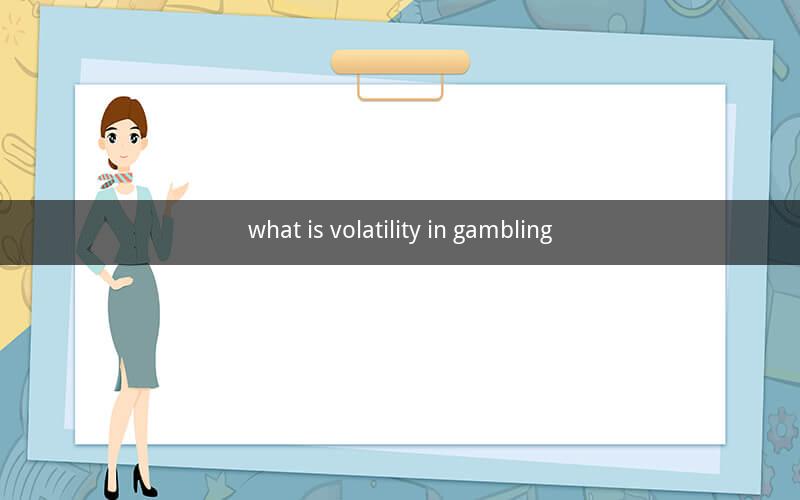
Table of Contents
1. Introduction to Volatility in Gambling
2. Understanding Volatility in Different Gambling Games
3. Factors Influencing Volatility
4. Strategies to Manage Volatility in Gambling
5. The Role of Volatility in Online Casinos
6. Volatility in Sports Betting
7. Volatility in Poker
8. The Impact of Volatility on Gamblers
9. The Legal and Ethical Aspects of Volatility in Gambling
10. Conclusion
1. Introduction to Volatility in Gambling
Volatility in gambling refers to the level of risk and uncertainty associated with a particular game or betting option. It is a measure of how much a player's bankroll can fluctuate over a certain period of time. High volatility implies that the player's bankroll can experience significant swings, both positive and negative, while low volatility suggests more consistent, albeit smaller, wins and losses.
2. Understanding Volatility in Different Gambling Games
Different gambling games exhibit varying levels of volatility. For instance, slot machines are typically considered high volatility games, as they can result in large, unpredictable wins followed by long losing streaks. On the other hand, games like blackjack and poker are often categorized as low volatility games, as they offer more consistent, albeit smaller, payouts.
3. Factors Influencing Volatility
Several factors can influence the volatility of a gambling game. These include:
- The game's rules and odds
- The number of players involved
- The skill level of the players
- The presence of bonuses or promotions
- The use of random number generators (RNGs)
4. Strategies to Manage Volatility in Gambling
Players can employ various strategies to manage the risk associated with volatility. These include:
- Setting a budget and sticking to it
- Choosing games with a lower volatility if risk aversion is a concern
- Using betting strategies to minimize losses
- Taking advantage of bonuses and promotions responsibly
5. The Role of Volatility in Online Casinos
Online casinos often offer a wide range of games with varying levels of volatility. This allows players to select games that align with their risk tolerance and playing style. Moreover, online casinos may also use volatility to entice players to try new games or increase their betting limits.
6. Volatility in Sports Betting
In sports betting, volatility can be influenced by various factors, such as:
- The skill level of the teams or players involved
- The weather conditions
- The home advantage
- Injuries and player suspensions
Understanding the volatility of a particular sports betting market can help players make more informed decisions.
7. Volatility in Poker
Poker is a game of skill and strategy, with volatility influenced by:
- The skill level of the players
- The number of players at the table
- The use of bluffing and betting strategies
Players must adapt their strategies based on the volatility of the game to maximize their chances of winning.
8. The Impact of Volatility on Gamblers
The impact of volatility on gamblers can vary significantly. Some players may find the thrill of potential large wins appealing, while others may become frustrated with the unpredictability of the games. It is crucial for players to be aware of the potential emotional and financial consequences of gambling.
9. The Legal and Ethical Aspects of Volatility in Gambling
The legal and ethical aspects of volatility in gambling are complex. Governments and regulatory bodies must balance the interests of players and operators while ensuring fair and responsible gambling practices.
10. Conclusion
Volatility is an essential aspect of gambling, influencing the risk and excitement associated with various games. Players should be aware of the volatility of the games they choose to play and employ strategies to manage the associated risks.
Questions and Answers
1. What is the difference between high volatility and low volatility in gambling?
- High volatility games offer the potential for large wins but also come with a higher risk of significant losses, while low volatility games offer more consistent, albeit smaller, wins and losses.
2. Can volatility be influenced by the skill level of the players?
- Yes, the skill level of players can influence the volatility of a game, particularly in games like poker and sports betting.
3. How can players manage the risk associated with volatility?
- Players can manage the risk associated with volatility by setting a budget, choosing games with lower volatility, and using betting strategies.
4. What is the role of random number generators (RNGs) in volatility?
- RNGs ensure that the outcome of a game is unpredictable, contributing to the volatility of the game.
5. Can bonuses and promotions affect the volatility of a game?
- Yes, bonuses and promotions can affect the volatility of a game by altering the odds and payout structure.
6. How does the presence of a home advantage influence volatility in sports betting?
- The presence of a home advantage can influence volatility by affecting the odds and potential outcomes of a game.
7. What are some common strategies used to manage volatility in poker?
- Common strategies include adapting to the skill level of opponents, using betting strategies, and bluffing responsibly.
8. How does the use of bluffing affect the volatility of a poker game?
- Bluffing can increase the volatility of a poker game by adding an element of unpredictability to the gameplay.
9. What are the potential emotional and financial consequences of gambling with high volatility?
- The potential consequences include increased stress, frustration, and financial loss.
10. How do governments and regulatory bodies address the legal and ethical aspects of volatility in gambling?
- Governments and regulatory bodies address these aspects by implementing laws and regulations that promote fair and responsible gambling practices.